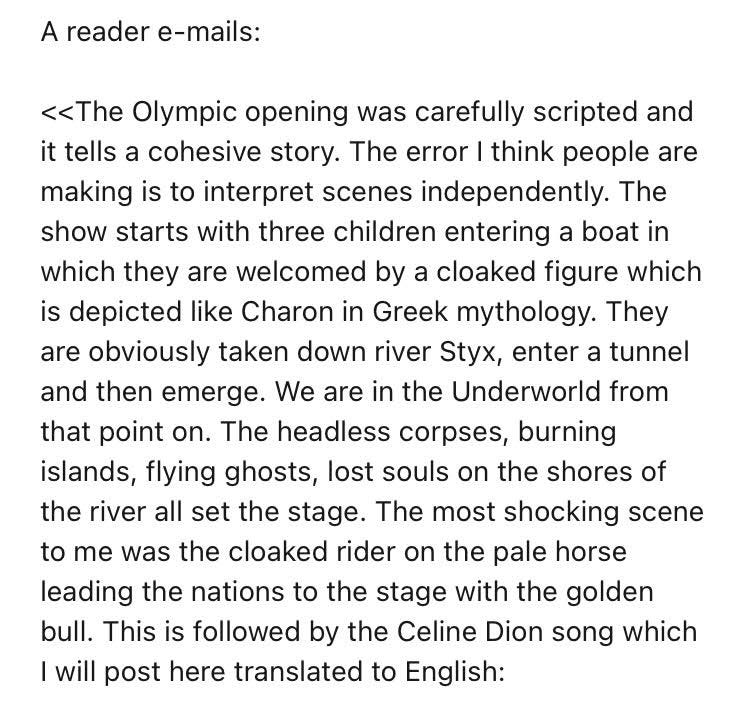Hold Your Applause
The Paris Olympic Opening as considered through Wile E. Coyote, demonic symbols, or being a discerning audience member
A few weeks ago, on a Saturday morning in a hotel in Tennessee, I walked in to see some of our sons watching old Looney Tunes on the television. The hapless Wile E. Coyote was, as usual, trying to snare the indomitable Road Runner. Coyote was in the process of unwrapping a product, presumably from the ACME corporation, in his unending quest to find the perfectly packaged silver bullet to destroy his nemesis and eat him.
This time, it was an exploding camera kit. “‘Trick your friends’,” drawled one of our boys in that sarcastic lilt common to teenagers as he read aloud from the cartoon. “‘Beeeeee popular.’” Unsurprisingly, the boys found Coyote’s fervid efforts hilarious, and they laughed at him.

I couldn’t help but immediately think of the opening ceremonies of the Olympics we’d witnessed the night before. We’d only caught a little of the spectacle, as we’d been traveling all day. But we did see the bizarre Last Supper parody, complete with strange-looking people dressed in frou-frou and caked with makeup. Suffice it to say they looked like the in-crowd out of the Capitol in The Hunger Games.1
Or more precisely, like the ruling French elite prior to the Reign of Terror (more on John Adams below).

Or even more precisely, like the regulars at your neighborhood Drag Queen Story Hour.
Amid comments of “what IS this?” from our kids and a general conversation about sin, one of the kids said something like, “What does this have to do with the Olympics?” The general audience response included slightly incredulous comments and, if I’m honest, mild snickering.
Frankly, the performance looked, well, stupid.
Loads of people have weighed in on the opening to the 2024 Summer Olympiad, so adding my thoughts seems a bit superfluous. But I do think we should consider our response to this performance.
And what was it, exactly?
I’d like to say there’s absolutely no connection between the ennobling quest for glory that comes from great physical prowess in competition and the perverted sights we saw. But unfortunately, both the ancient games and that grotesque performance demonstrated religious devotion apart from the one true God. Our Olympic forebears in Greece were pagans; our current Olympic elite autocracy are, too, in other ways. Regardless of the era, there’s no doubt what happens when people turn away from the Truth: they will believe lies. And who is the Father of Lies? That would be Satan.
You didn’t even have to look hard at the Olympic opening to find an embrace of the demonic, either. We missed it, but others watching didn’t. For instance, there was that moment when a beheaded Marie Antoinette stood in a window where the real woman once was held, holding a skull in her hands while she sang the words “All will be well.” Meanwhile, key visual accouterments included flame, and lots of it. (Rod Dreher speaks to this in his Substack column below.)
Classic literature can help explain some of the imagery, if flames and darkness weren’t enough to indicate the message being communicated. Here’s a comment on the Opening Ceremony I found helpful (find it under this post):
More on the song in a moment, but reread that line: “We are in the underworld from that point on.” I think the writer is right. And that cloaked rider was clearly taken from the book of Revelation, as the fourth horseman of the Apocalypse, who is Death. So a symbol of Death led in the athletes.
If that wasn’t enough, the crowning moment of the ceremony was “Hymne à l’amour,” both song and lyrics by Édith Piaf, and sung by Dion. A partial translation runs as follows:
The blue sky above us may collapse
And the Earth may well crumble
I don't care if you love me
I don't give a damn about the whole world
…
I would go to the ends of the earth
I would dye my hair blonde
If you asked me to
I would go and take down the Moon
I would go and steal fortune
If you asked me to
I would deny my homeland
I would deny my friends
If you asked me to
People can laugh at me
I would do anything
If you asked me to
If one day, life tears you away from me
If you die, if you are far from me
I don't care if you love me
Because I would die too
We will have eternity for ourselves
In the blue of all immensity
In heaven, no more problems
My love, do you believe we love each other?
God reunites those who love each other
Who, exactly, is the “you” in what Dion sang? Most people probably heard it as yet another heart-stopping pop song ardently expressing the wonders of romantic love, like all of Dion’s biggest hits.2 But in this context, the “you” is decidedly not someone who is the loving, sacrificial, only God in Christ Christians confess. The “god reunites those who love each other” holds no identifiers about God; it only rests on the fervent worship of the one “loving” the other. So the sky can collapse, the earth can crumble, one can deny friends and homeland, and the world can be effectively damned for someone or something that might not reciprocate love, as all the “if you love me” lines seem to testify. The “if” does a lot of work. It’s conditional and thus coldly transactional. That kind of recipient sounds an awful lot like the Devil promising everything to Jesus if He only, you know, denies His divinity and worships Satan instead.3
This oblique testament of a spiritual and physical embrace of hell came through in the featuring of the song “Imagine.” This song has been a sort of tradition at more recent Olympic games, which before last night has seemed stupidly naive in its wish for world peace but not, perhaps, sinister in its inclusion. But now? The words “Imagine there’s no heaven” and “Nothing to kill or die for/and no religion too,” while the tune plinks out of a flaming piano, sounds like yet another incantation for the dissolution of what is most important to us: family, the ties to our sovereign nations and thus to our communities, and, of course, any links to the triune God, our Creator and Redeemer. And the words “no hell below us”? That just allows for it here, like in Paris. All those flames add a whole new meaning to the moniker the City of Light.
The overall performance seems more than slightly coincidental: the coming together of all of this anti-Christian and pro-dark messaging, including the parody of a well-known Christian painting, the clear veneration of queer trans personas, the embrace of death and blood in a nod to the French Revolution, and two paeans to some kind of oneness by rejecting the bonds that actually unite people?
It looks and sounds like the rise of the demonic.
Now the big question: what are we going to do?
When we see things like this, will we explain it away? Shrug along helplessly? Weakly embrace weirder and stranger and, frankly, more and more flagrantly human-abolishing performances by those with cultural and media power? In other words, will we clap because others are clapping?
Last night, we had dinner guests who appreciate fine music and live performances. Someone brought up a recent recital he’d attended that featured a piece for a harp and two saxophones, which sounds like a joke but wasn’t. It was painful to listen to, he said, and others around him in the audience agreed. Yet perfunctory clapping ensued after the piece was over. “Why does everyone feel obligated to clap for things that aren’t actually good?” someone said. We agreed that a return to discerning audiences who don’t just clap because that’s the social norm would benefit everyone.4
Why? Because silly spectacles, in particular, don’t need encouragement. They need to be called out. They are exploding camera kits, sham products, designed to sell something ostensibly empowering but actually degrading. These performances will neither get us what we want or, obviously, win us lasting friends, despite promises to the contrary.
We should all refrain from clapping at them, either out of thoughtless conformity or fear-induced pressure. Instead, we should react in truth to the ridiculous messages of these spectacles, even if the performers try to make us out to be clueless, care-less idiots. See again the faux-victimhood line “people can laugh at me” in the lyrics above. You know what? We will, and we should.
This isn’t just to make fun of the ridiculous, thought it certainly can include that. It’s also a nod to those who are serious about honoring what is truly good, true, and beautiful in art. After all, there comes a certain austerity of temperament in hard times. If you can’t eat or clothe yourself without effort, you can’t act frivolous without seeming callously childish, if not outright dumb. You need people like, say, John Adams to remind you of goals beyond what you yourself can achieve, of beauty and real refinement that only results from stability and sacrifice others make.5
And even if you don’t live in hard times, you can be discerning. You can decide to appreciate what’s good and what actually edifies humanity. So when the performance ends, wait a little bit. Clap, certainly, if it’s deserving of praise. But if you’re witnessing an exploding camera kit, hold the applause. In fact, give it the laughter it deserves.

I saw a meme of this on X somewhere, but alas, I can’t find it. Let this footnote suffice as partial credit.
I was a fan of Dion in my high school and college years, but I soured on her, mostly because I grew out of the obsessive romanticism her music portrayed. But after her extremely disturbing embrace of the demonic in her children’s clothing line, I was really done. Celinununu was about eradicating the gender binary and dressing kids in skulls. That was about five years ago. The line doesn’t seem to exist anymore, but you can still find weird, creepy, way overpriced kids clothes at nununu. I don’t recommend looking at it unless you want to be convinced of elite preoccupations with the occult.
I really didn’t want to get into a textual analysis here, but I dabbled a little because words are important and we need to pay attention to them. Forgive my hackneyed job here.
The normal caveats for applauding for children who are learning to perform here, and no, not kids being groomed for something evil. I’m thinking nervous kids at piano recitals.




